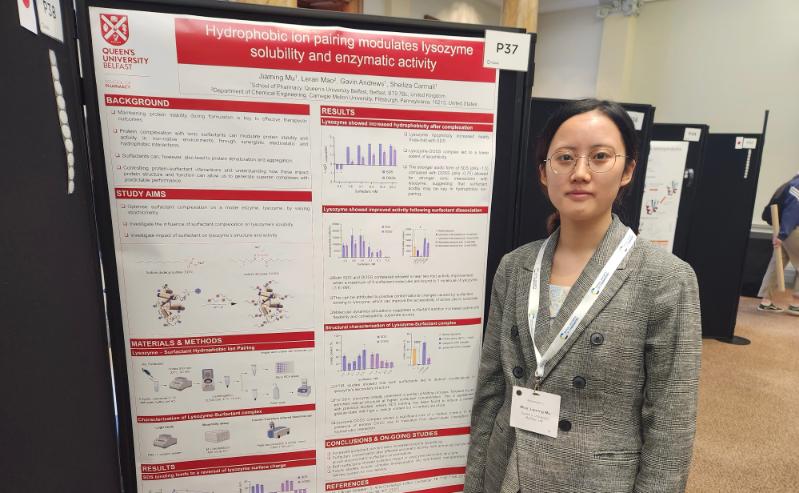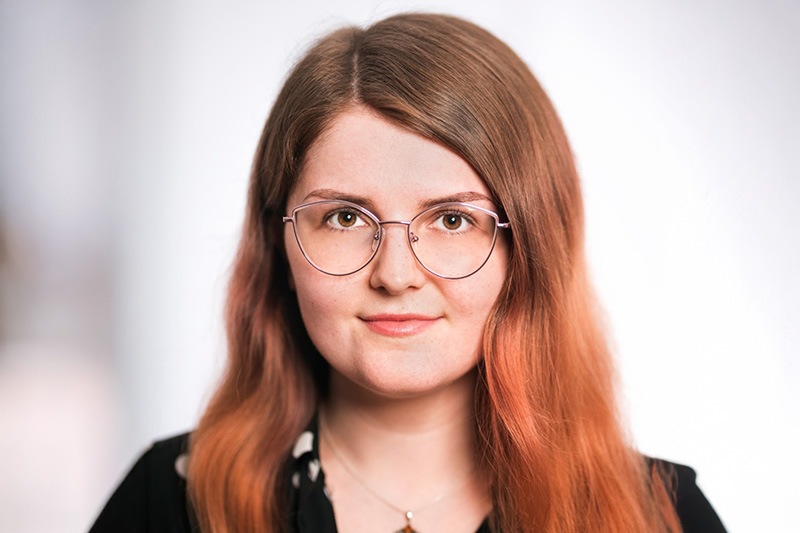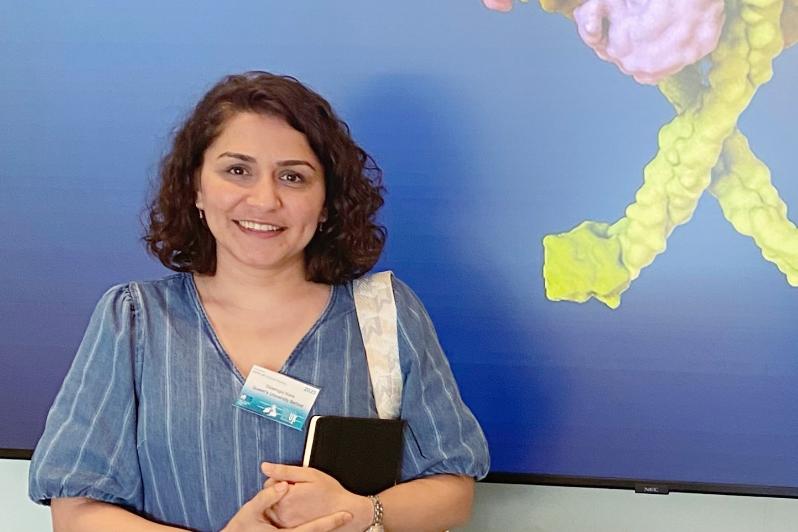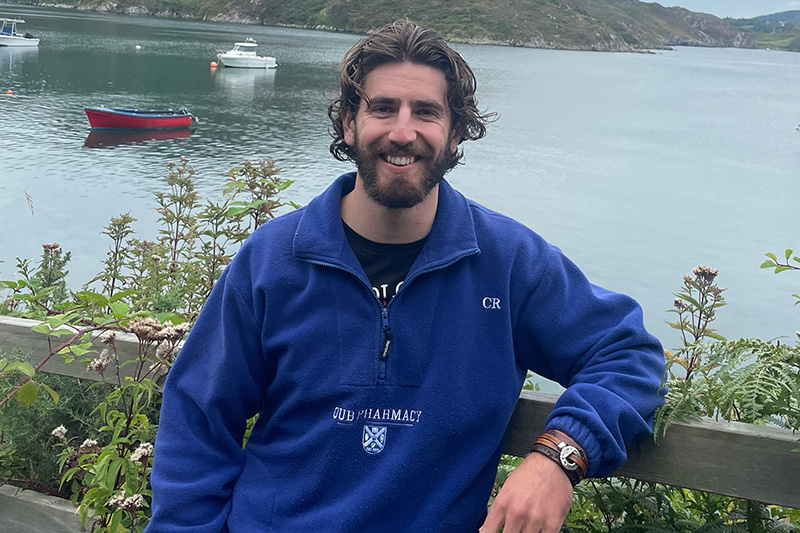Student Experience

We aim to provide a supportive and enriching environment that empowers our postgraduate students to thrive, offering targeted academic, personal, and professional development opportunities designed to enhance career success and cultivate future leaders across a range of research sectors.
On this page, you can explore more about our postgraduate students’ experiences at the School, including the tailored support available to help them achieve success and future readiness.
Read more about the experience of postgraduate students here at the School of Pharmacy, and how our support is preparing them for their future careers.

Funding stream: Queen's University Belfast/China Scholarship Council Scholarship
My PhD investigates protein engineering through hydrophobic ion pairing, using controlled surfactant complexation to improve protein delivery systems. I focus on creating modified proteins that integrate effectively into lipid-based carriers while preserving their biological function.
By combining wet-lab experimentation with computational insights, I've rationally designed protein-surfactant complexes that actually enhance protein performance. My research shows these modified proteins are twice as soluble in pharmaceutical lipids, achieve better encapsulation, and increase biological activity up to two-fold, which challenges the assumption that chemical modification reduces protein function.
The ability to modify protein surface properties while maintaining activity has significant implications for oral drug delivery, particularly for overcoming intestinal absorption barriers and improving patient outcomes. It is exciting to be working at the interface of fundamental protein chemistry and pharmaceutics, ultimately contributing to the next generation of protein delivery technologies.
I have a wonderful supervisor who has helped me at every step of my PhD journey, who listens to any problems I have in my work, and who has provided support in every instance, encouraging me to step out of my comfort zone. I've presented my work in conferences and in the form of other presentations. I also work with a great team whom I can share ideas with at any moment.
I feel that a PhD is a great opportunity to challenge yourself and further work at something you are passionate about. You will make a lot of new connections and gain a lot of skills along the way.

Funding stream: Self-funded
My PhD project investigates the issue of medication-related harm in people with dementia using a mixed-methods approach.
To date, my research includes a systematic review of the literature, and qualitative interviews with patients, carers, and researchers. In the future, I plan to interview healthcare professionals and conduct a Delphi study with a panel of expert researchers.
I'm really enjoying doing my PhD at Queen’s. The facilities are excellent, and I get great support from my supervisors and the other students in my research group. Although our research will focus on different topics or patient groups, we often use similar methodology, so we share tips and tricks with each other!
The Graduate School at Queen’s also runs very helpful training courses on everything from academic writing skills to literature searching with the library. Within the School, there are plenty of demonstrating opportunities, helping out with workshops and acting as patients or healthcare professionals during OSCEs, which are great for getting some teaching experience. I’m looking forward to my future career, as a PhD provides you with a lot of transferable skills that employers really value. Overall, I would really recommend doing a PhD in the School of Pharmacy as the staff are world class and you will be involved in cutting edge research.

Funding stream: Ministry of National Education, Turkiye
My PhD investigates the regulation of Serotonin 1A receptor (5-HT1A) by membrane cholesterol molecules, aiming to identify novel allosteric modulators with therapeutic potential for neuropsychiatric disorders such as major depressive disorder. Using the Northern Ireland High Performance Computing (NI-HPC) service, we apply molecular dynamics simulations and virtual screening to explore receptor–lipid interactions.
Furthermore, the project involves validation of computational findings through advanced experimental assays carried out at the Wellcome-Wolfson Institute for Experimental Medicine at Queen’s University (WWIEM), thereby providing insights that could guide the modulation of serotonergic signaling for therapeutic purposes.
In addition, my research investigates rare variants of the Serotonin 1A receptor (5-HT1A) and their impact on downstream signaling and pharmacological responses. This includes characterizing how specific amino acid substitutions alter receptor’s conformational dynamics, signaling profiles, and sensitivity to clinically relevant ligands.
It is clear that there is a need for novel therapeutic approaches that precisely modulate serotonergic signaling in neuropsychiatric disorders, aiming to enhance drug specificity while minimizing the side effects of current treatments. I am personally passionate about atoms, human genetics and brain. My research integrates these contexts, contributing to the advancement of our understanding of serotonergic signaling in the human brain at the atomic level.
I feel consistently supported by my primary supervisor, Dr Irina Tikhonova, as well as my second supervisor, Dr Bianca Plouffe. Both are deeply passionate about science and have nurtured my own ambition to achieve my research goals. I also benefit from the resources of the Thomas J. Moran Graduate School, where I attend training sessions and workshops that enhance my translational and developmental skills. These opportunities have allowed me to connect with other PhD students across QUB, fostering a sense of academic community. I am also energized by the vibrancy of campus life, which provides opportunities to engage with fellow researchers and exchange ideas across disciplines.
As part of the scholarship, I hold a Teaching Fellow position at Alanya Alaaddin Keykubat University in Turkiye. I hope to continue my research in Turkiye after completing my PhD. However, I am also open to pursuing postdoctoral positions to further expand my knowledge and research experience before ultimately settling in the pleasant climate of the Turkish Riviera. For me, science feels like a calling, even if I do not believe in destiny. I am simply drawn to follow my passion for research wherever it thrives.
I believe a PhD is a perfect fit for those driven by a deep curiosity in science, constantly pushing them beyond their comfort zone and challenging them to confront complex, thought-provoking questions. However, seeking answers to these questions requires not only curiosity but also resilience and discipline. For those who have the perseverance to focus on solutions rather than dwelling on failures and the dedication to push the boundaries of knowledge, I would recommend following their passion through a PhD journey.

Funding stream: Northern Ireland Department for the Economy (DfE) studentship
I'm a 2nd year PhD student in the School of Pharmacy. The title of my PhD is 'Cold plasma for enhancement of intracellular delivery of macromolecules’; essentially, pushing big molecules into cells using ionised gas devices. I had the fortunate opportunity to work with my current supervisor, Professor Brendan Gilmore, on much the same project during my undergraduate MPharm degree.
I thought lab work might be a repetitive, isolated experience. But I found the opposite: it was lively, social, and different every day. What I enjoy most about my PhD is the freedom to pursue the science that interests me, the support of other students and staff, and the opportunities to travel and develop new skills. After my studies, I hope to stick in academia and pursue a career in research and teaching.
